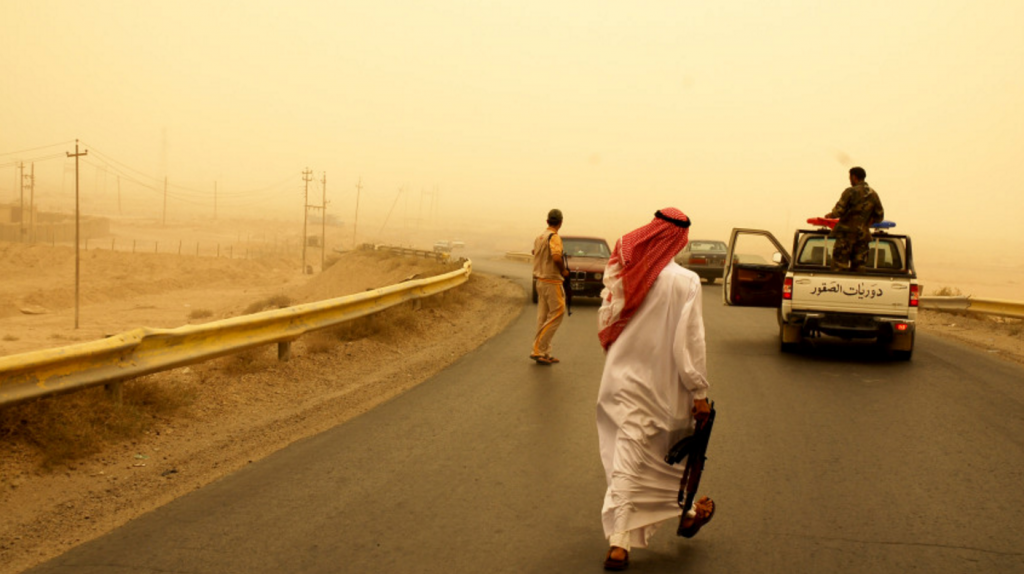
Belgian photo-journalist Laurent van der Stockt and French reporter Lucas Menget have jointly collaborated to create “Baghdad, Chronicle of an Immured City”, a film about the day to day experiences of social divisions in war-ridden Baghdad.
Belgian photo-journalist Laurent van der Stockt and French reporter Lucas Menget have jointly collaborated to create “Baghdad, Chronicle of an Immured City”, a film about the day to day experiences of social divisions in war-ridden Baghdad.
Van der Stockt, receiver of the Columbia University School of Journalism Award and the Paris Match Prize amongst other recognitions, has extensive experience working in conflict areas such as the former Yugoslavia, Afghanistan, Chechnya, Iraq and Syria. Menget, editor in chief at French news TV channel I-Télé, has focused his own work on conflicts in Iraq, the Middle East and various regions in Africa, Asia and South America.
Their collaboration has led to a deeply insightful take on the reality of war-affected Baghdad. Their work, “Baghdad, Chronicle of an Immured City” begins with an insider’s view of family life in Baghdad and how what seems to be a normal gathering of relatives becomes a revealing space of the fears, divisions and concerns affecting the lives of everyday Iraqis. “I can see nothing to give us hope at all,” explains one family member as he goes on to describe how he was nearly killed by a car bomb in the middle of the city.
The movie further explores the social divisions created in Iraq as a consequence of international intervention, the civil war between Sunni’s and Shiite’s, and the emergence of Daesh as a further dividing threat for both the people of Baghdad and Iraqi citizens in general.
The effects of issues such as religious sectarianism, the rise of extremist terrorism through ISIS, and the way religion and politics have forced social divides within the country are intricately analyzed through the lenses of Menget’s and Van der Stockt’s cameras. An example of this includes the on-screen appearance of Zainab, an elderly Iraqi citizen who depressingly expresses her concerns about civil war and terrorism in Iraq: “This is the worst time of my life. All Iraqis suffer. This is worse than the Iran-Iraq war.”
Equally insightful were the views of Lucas Menget after the film’s presentation. He explained how the most difficult issue during filming was not gaining access to government compounds during coverage of the ongoing “video propaganda war” between the Iraqi government and ISIS, but to gain the trust and approval of Iraqi citizens in order to enter into their lives and film inside of their homes.
A real ethnographic experience, product of Menget’s and Van der Stockt’s approach to everyday life in Baghdad, the film reveals important parallels to many of Bosnia’s post-conflict issues. The nostalgia for a past of harmonious coexistence and friendship between all citizens, the realization of how the embedding of religion and politics into people’s lives has affected them forever, and the urgent call for social reconciliation are all cross-cutting themes. Perhaps this last point is best expressed in the words of Kassim, an engineer, who explains to the camera how, despite the existence of walls that divide the city, there remains a sense of unity among the people in his neighborhood: “Everyone knows who is Sunni or Shiite. It is not a problem. This is one of the areas that coexists without any problems”.
—
“Baghdad, Chronicle of an Immured City” had its Balkan premiere during the 3rd annual War Art Reporting and Memory (WARM) Festival. The WARM Festival took place in Sarajevo from Sunday 26 June to Saturday 2 July 2016. Organized by the WARM Foundation in collaboration with the Post-Conflict Research Center (PCRC), the Festival brings together artists, reporters, academics and activists around the topic of contemporary conflict.






